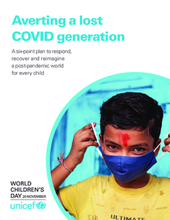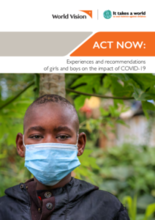Displaying 1201 - 1210 of 4424
In this document, UNICEF calls for A Six-Point Plan to Protect our Children, a list of urgent actions to mitigate the worst effects of the COVID-19 pandemic and a practical recovery plan to safeguard child rights now and to reimagine a better future.
The current paper aims to suggest a framework for risk and protective factors that need to be considered in child protection in its various domains of research, policy, and practice during and after the COVID-19 pandemic.
The current paper aims to suggest a framework for risk and protective factors that need to be considered in child protection in its various domains of research, policy, and practice during and after the COVID-19 pandemic.
This panel discussion, timed with the launch of the Beyond Masks report, will delve deep into Beyond Masks to better understand how its findings can shape national and subnational policy responses and individual, family and community behaviors.
This presentation - delivered by Marinus van IJzendoorn at a 18 November 2020 meeting of the Evidence for Impact Working Group, a working group of the recently launched Transforming Children's Care Global Collaborative Platform - presents evidence of the harmful impacts of institutionalization on children, demonstrates some of the benefits of deinstitutionalization for getting children back on track, and raises questions about gap-year volunteers working in orphanages.
Following thousands of comments and responses posted by the 8,000 course participants for the MOOC on COVID-19: Adapting Child Protection Case Management, as well as research and evidence being issued by child protection agencies, three international experts were invited to provide short videos containing advice and opinions of experts in different regions of the world regarding the need to plan for support for children for the evolving situation of COVID-19 and in particular post-pandemic scenario.
This research aimed to provide a systematic review of the evidence on the COVID-19 pandemic’s impact on youth mental health.
The UBS Optimus Foundation will award one or more grant prizes of up to USD 1m to organization(s) that have demonstrated or are seeking to demonstrate rigorous evidence of achievement of outcomes in several areas - including prevention of children being separated from families due to reasons such as poverty, violence, abuse or lack of access to basic health and education - through an intervention implemented in the context of COVID-19.
This global report is a consolidation of six regional reports based on consultations conducted between April and August 2020 that used a qualitative approach. The report is organised around the three themes emerging from the data: (1) the impacts of COVID-19 on children and young people; (2) their resilient responses to these impacts personally, in their families and communities; and (3) the support that children and young people need to be safe, healthy and help to fight the further spread of the virus.
Please Helping Children Worldwide for their second annual Rising Tides Conference to learn and collaborate on how the global church can help orphaned and vulnerable children thrive in families.



